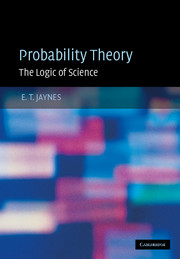Book contents
- Frontmatter
- Contents
- Editor's foreword
- Preface
- Part I Principles and elementary applications
- Part II Advanced applications
- 11 Discrete prior probabilities: the entropy principle
- 12 Ignorance priors and transformation groups
- 13 Decision theory, historical background
- 14 Simple applications of decision theory
- 15 Paradoxes of probability theory
- 16 Orthodox methods: historical background
- 17 Principles and pathology of orthodox statistics
- 18 The Ap distribution and rule of succession
- 19 Physical measurements
- 20 Model comparison
- 21 Outliers and robustness
- 22 Introduction to communication theory
- Appendix A Other approaches to probability theory
- Appendix B Mathematical formalities and style
- Appendix C Convolutions and cumulants
- References
- Bibliography
- Author index
- Subject index
15 - Paradoxes of probability theory
from Part II - Advanced applications
Published online by Cambridge University Press: 05 September 2012
- Frontmatter
- Contents
- Editor's foreword
- Preface
- Part I Principles and elementary applications
- Part II Advanced applications
- 11 Discrete prior probabilities: the entropy principle
- 12 Ignorance priors and transformation groups
- 13 Decision theory, historical background
- 14 Simple applications of decision theory
- 15 Paradoxes of probability theory
- 16 Orthodox methods: historical background
- 17 Principles and pathology of orthodox statistics
- 18 The Ap distribution and rule of succession
- 19 Physical measurements
- 20 Model comparison
- 21 Outliers and robustness
- 22 Introduction to communication theory
- Appendix A Other approaches to probability theory
- Appendix B Mathematical formalities and style
- Appendix C Convolutions and cumulants
- References
- Bibliography
- Author index
- Subject index
Summary
I protest against the use of infinite magnitude as something accomplished, which is never permissible in mathematics. Infinity is merely a figure of speech, the true meaning being a limit.
C. F. GaussThe term ‘paradox’ appears to have several different common meanings. Székely (1986) defines a paradox as anything which is true but surprising. By that definition, every scientific fact and every mathematical theorem qualifies as a paradox for someone. We use the term in almost the opposite sense; something which is absurd or logically contradictory, but which appears at first glance to be the result of sound reasoning. Not only in probability theory, but in all mathematics, it is the careless use of infinite sets, and of infinite and infinitesimal quantities, that generates most paradoxes.
In our usage, there is no sharp distinction between a paradox and an error. A paradox is simply an error out of control; i.e. one that has trapped so many unwary minds that it has gone public, become institutionalized in our literature, and taught as truth. It might seem incredible that such a thing could happen in an ostensibly mathematical field; yet we can understand the psychological mechanism behind it.
How do paradoxes survive and grow?
As we stress repeatedly, from a false proposition – or from a fallacious argument that leads to a false proposition – all propositions, true and false, may be deduced.
- Type
- Chapter
- Information
- Probability TheoryThe Logic of Science, pp. 451 - 489Publisher: Cambridge University PressPrint publication year: 2003
- 2
- Cited by



